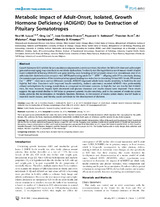Metabolic Impact of Adult-Onset, Isolated, Growth Hormone Deficiency (AOiGHD) Due to Destruction of Pituitary Somatotropes

Ver/
Autor
Luque, Raúl M.
Lin, Quig
Córdoba-Chacón, José
Subbaiah, Papasani V.
Buch, Thorsten
Waisman, Ari
Vankelecom, Hugo
Kineman, Rhonda D.
Editor
Public Library Of Science (PLOS)Fecha
2011Materia
Disfunción metabólicaMetabolyc disfunction
GH
GHD
METS:
Mostrar el registro METSPREMIS:
Mostrar el registro PREMISMetadatos
Mostrar el registro completo del ítemResumen
Growth hormone (GH) inhibits fat accumulation and promotes protein accretion, therefore the fall in GH observed with weight
gain and normal aging may contribute to metabolic dysfunction. To directly test this hypothesis a novel mouse model of adult
onset-isolated GH deficiency (AOiGHD) was generated by cross breeding rat GH promoter-driven Cre recombinase mice (Cre)
with inducible diphtheria toxin receptor mice (iDTR) and treating adult Cre+/2,iDTR+/2 offspring with DT to selectively destroy
the somatotrope population of the anterior pituitary gland, leading to a reduction in circulating GH and IGF-I levels. DT-treated
Cre2/2,iDTR+/2 mice were used as GH-intact controls. AOiGHD improved whole body insulin sensitivity in both low-fat and
high-fat fed mice. Consistent with improved insulin sensitivity, indirect calorimetry revealed AOiGHD mice preferentially
utilized carbohydrates for energy metabolism, as compared to GH-intact controls. In high-fat, but not low-fat fed AOiGHD
mice, fat mass increased, hepatic lipids decreased and glucose clearance and insulin output were impaired. These results
suggest the age-related decline in GH helps to preserve systemic insulin sensitivity, and in the context of moderate caloric
intake, prevents the deterioration in metabolic function. However, in the context of excess caloric intake, low GH leads to
impaired insulin output, and thereby could contribute to the development of diabetes.
